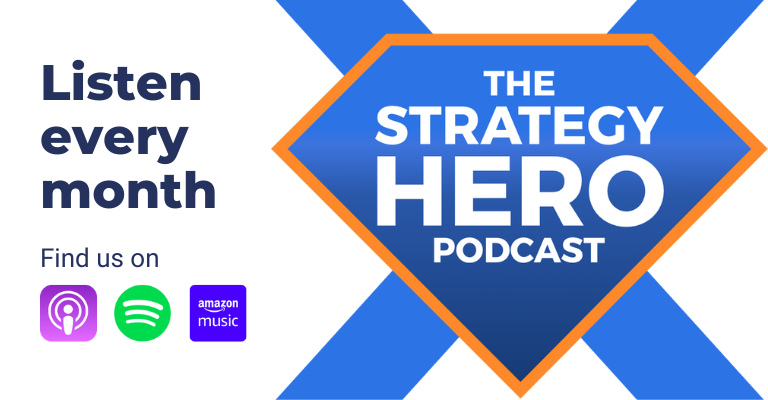From continuous communication to taking risks as a leader, here's what I learned from season two, episode nine of Strategy Hero with Grant Elder.
From his beginnings as a CFO through to CEO and consulting, Grant Elder has seen it all in the world of business management and strategy execution over the course of 27 years. In the ninth episode of Strategy Hero, season two, I sat down to reflect on that journey and what Grant sees as the keys to leading change.
Here's what I learned from my time with Grant.
It’s important to note that my opinions do not reflect those of i-nexus of Grant Elder.
Enjoy!
Why Grant?
Over the course of nearly three decades, Grant Elder has been on the frontline of business management.
Whether it's as a VP, CFO, or CEO, change has been a constant.
We wanted to invite Grant to the show because of his extensive list of experience - specializing in Lean methodologies such as Kaizen, TPM, and Agile - and his proven track record in integrating improvement processes into management systems.
With experience across consulting and line management, Grant's reputation for an empathetic leadership style and hands-on approach to driving change made him the perfect guest.
While the episode was framed around change leadership, it's Grant's ability to empathize that, on reflection, made him the right guest for the episode:
"I will talk to everybody and I will walk on the floor and I will ask questions at a detailed level. It takes longer. It does, because you don't have the luxury of just doing that in charge of everything. Walking and talking and seeing and understanding is huge."
It was my pleasure to bring him on.
Empathy is key to change leadership
Starting off as a he meant to go on, Grant spoke early and often about the role of empathy in his career.
Having started as a consultant, Grant typically found himself in roles that lasted two years on average. That time in a consulting gig created separation from the environment he was attempting to change.
In fact, he noted that leadership was once “brutal... cost-cutting, head-cutting,” with little room for empathy.
It wasn't until Grant took internal roles that he began to see the importance of empathy (and its not being tied to having an internal or external role:)
“The line position helps you understand what you might not understand as a consultant. So you come in as a consultant and you've got to focus. You've got a mission and deliverables. The line manager has the day to day responsibility of people in an organization. So they're conflicted from the beginning.
That allowed me to have empathy by being in the line and being under fire and being responsible for those things and understanding how it conflicts with the improvement process you've got to bring in.”
Grant characterizes this as a consequence of a command and control approach to management, which loses its sway when considering the mammoth task of organizational change. That is where he feels the lack of empathy took root. It was from an era of consulting filled by ex-military leaders, where goals were set without full regard for the people delivering the work on the frontline.
Over time, Grant found that listening and showing empathy “bridges the gap for communication.”
As Grant explained, once people believe you care about their concerns, they are more open to change and dialogue. That's too often lost in the noise of theories and frameworks.
You must continuously communicate
Grant spoke clearly in the episode about the role of continuous communication. I found it interesting how he linked the success of strategy deployment with organization-wide communication. Too often companies communicate their strategy at a top level (often fed by consultants,) and this gets lost by the time it reaches the people doing the doing.
More importantly, communication isn't a one time task. You have to repeat the same message often, and as many as 12 repetitions are key to ensuring that everyone understands objectives:
"It's nice to be in the ivory tower and have your thoughts on everything, but when you get down to the line level, you start getting reality and see issues.
We have a responsibility to communicate at a very detailed level with as many people as possible in the organization. That takes time.
I've been in organizations where I've given the same speech probably twelve times. You have no choice. That's what you've got to do."
The repetition creates the clarity and alignment that are crucial to any change.
By consistently reinforcing strategy through different touchpoints, you'll see your strategic goals coming through to the surface on a daily work level. Everyone feels part of the process.
This creates a stronger connection between leaders and the broader workforce, empowering employees to contribute to the execution of the strategy.
Continuous communication isn’t just about spreading information—it’s about listening, engaging, and allowing space for feedback, enabling the strategy to adapt and thrive in real time.
Simply, you've got to communicate as much as possible.
Be prepared to take risks
Inherently linked to Grant's stressing of empathy and communication are his reflections on the state of leadership in the 2020s. It could be seen as a rally cry, but it's one Grant clearly believes in:
"You need to evaluate the leader and their capacity for risk, because sometimes you have no choice. You have some docile leaders who've survived, navigated themselves up the ladder by playing it safe.
When all of a sudden your organization is in a new environment, especially these days, you've got a strategic plan that might be facing failure before it's completed because of an environmental change."
Grant is referring to the reluctance of leaders to change. That reluctance often comes from creating a strategy and accompanying strategic plan that doesn't have the flexibility to be altered. That flexibility can only come from a working culture that embraces questions and documents learnings.
All roads point back to the importance of strong leadership. Because, whether it's certain or uncertain times, empathy shouldn't shift.
Embrace your teams to complete situational analyses using tools like SWOT and PESTLE, and listen to their feedback. The insights that they provide will give you two things: i) a plan that leverages subject matter expects routed in operations, and ii) more team members to help you adapt when your plans stutter.
Don't play it safe. Prepare by empowering. Adapt with confidence.
My takeaway: get onto the floor
As I reflect, my key takeaway is a straightforward one, but not to be overlooked:
“You’ve got to be on the floor, where things are happening.”
If we cannot understand frontline operations, our plans are bound to fail.
are often disconnected from the reality of execution.
This hands-on approach allows leaders to understand the intricacies of their operations, identify bottlenecks, and drive meaningful improvements.
Thanks for being our eighth hero of the season, Grant!
Listen to the episode
Grant's episode was the ninth of season two of Strategy Hero.
You can listen to Grant's episode here, search "Strategy Hero" wherever you find your favorite podcasts, or click the play button below.
About Strategy Hero
Published on the last Thursday of every month, the Strategy Hero podcast delves into business strategy and transformation.
Each cast shines a spotlight on a Strategy Hero – inspirers, boundary pushers, and leaders of change from all walks of life – armed with practical advice on achieving your goals.
Episodes explore topics around operational excellence, Lean management, process improvement, change management, and much, much more. Available where all great podcasts live, listen on-demand today and discover the Strategy Hero inside you.
About the host
James Milsom is the former Head of Marketing at i-nexus, but James is a storyteller. He’s the UK’s biggest Georgia Bulldogs fan (Go Dawgs!) and lives and breathes marketing.
The Strategy Hero podcast is his opportunity to bring some of his conversations with mentors, inspirers, and people anew to you every month.
If you’d like more strategy content, subscribe to the Strategy Hero podcast today!



.jpg?width=352&name=KPIs%20(3).jpg)